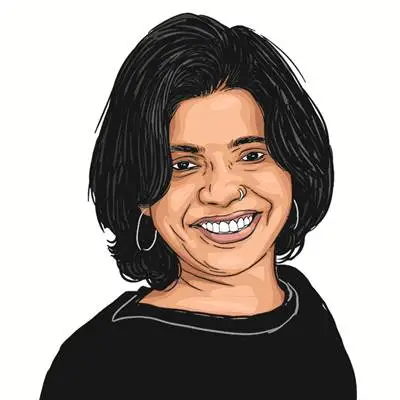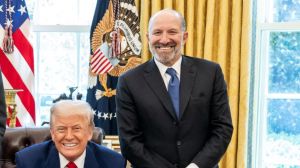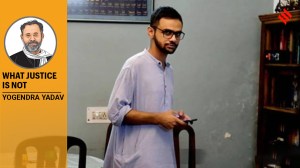
YADAV: It was a collaboration because both approached each other. I used to meet and interact with Ilaji during parliamentary committee meetings. Informally, I used to discuss economic issues with her often. She asked me after the 2019 elections why I did not write about the BJP’s growth. I realised I needed economic perspective too.
What did you learn from each other during this project?
Story continues below this ad
PATNAIK: I did not know politicians could be so well-read. Any new book or article, he was clued in and remembered it. The level of scholarship… in academics you expect it, but not in politicians… was surprising to me. Second was his commitment towards academic rigour. He would get all the primary material and pull out whenever we were looking for, a document or a resolution. Third was the level of openness to cite other views and those of critics.
YADAV: Her economic background has been a great help. The way she looked at developments and the stance of the party helped me understand the BJP in a different way too. My academic assessment capabilities improved.
You talk about Amit Shah’s distinctive approach to politics, about endlessly refining a party as a competent organisation that could focus on winning one election after another. But others say the BJP has been reduced to an election-winning machinery, ready to do anything to win an election.
YADAV: Not at the cost of anything. We are not a party that came to power disrupting the democratic process. Our approach is not mechanical. I do not agree that we are an election-winning machine. We are here to win the hearts of people. Amit Shahji works hard, that’s his speciality. He works on the ground till 2 am or 3 am continuously, staying in interior areas, understanding state politics and its nitty gritties to anlayse political situations… This is courage, not mechanical.
Story continues below this ad
You write that BJP governments focus on better governance and on welfare measures. Then why is election campaigning becoming so polarised, including religious references by BJP star campaigners?
YADAV: More than the BJP, the Opposition talks about religion or Hindutva, to accuse us of being communal. When you term one party communal, you are also trying to polarise, is it not? But no one is questioning them.
Are you saying it’s a reaction to an action?
YADAV: No. (But) When we put things in a particular way, more people will give it a colour. So I think this is used against us more than we use it.
In Uttar Pradesh, the BJP has devised various strategies to reach out to voters. What has been the most successful one?
YADAV: Our programmes for the poor and the way the BJP has reached out to the people, through targeted and last-mile delivery. I also think the way the government has worked in the last two years during the Covid pandemic and the vaccination programme would help us.
Story continues below this ad
In the book, you refer to several instances where a cluster of states held elections at the same time as a semi-final to the general elections? Do you see the current one as a semi-final contest?
YADAV: No, I do not. It’s an important election, involving a large section of the electorate. (But) I would not say it is a semi-final. For all parties, every election is a popularity test. And the BJP considers all elections important.
Under NDA I in 1998, when the BJP formed a coalition government, a new team could not take shape. Is the BJP different now? It has been facing a lot of criticism for “centralising”, not building strong second-rung leadership.
YADAV: A second-rung leadership has come up. In the history of the BJP, a new team came up with (L K) Advani, (M) Venkaiahji (Naidu), same with Rajnath Singhji, Nitin Gadkari and Amit Shahji. You won’t find any other party with such a battery of former national presidents… you can assess the BJP’s democratic ways (from this). There is a huge age difference also between the leaders, showing we have developed a chain of leadership.
Story continues below this ad
Vajpayee-led BJP could keep allies with it. Has that changed?
YADAV: That’s not the right way to look at. The AIADMK was our ally during that time and it left us. Ram Vilas Paswan also left but later returned. The alliances at the regional level can change according to local political situations. But we know that regional aspirations should exist along with national ambitions… You may ask those who have left us, the BJP always wants to take everyone along.
You often refer to yatras in your book, and the BJP has a formidable organisational network. The ban on such traditional forms of campaign like yatras or rallies due to Covid curbs… does it not hit the BJP?
YADAV: The BJP has kept improvising its communication strategies. There was a time when you needed yatras to reach people, then, when it was the time of television, the BJP really took interest in TV debates, now we make use of social media and lately digital media.
Does campaigning becoming digital help the BJP?
Story continues below this ad
YADAV: The party is at an advantage because of its policies, performance and because of its non-corrupt leaders… People need to participate in the election process but they need to be safe as well… It’s up to the Election Commission to decide the ways, but for connecting with people, physical rallies and door-to-door campaigns are the best.
The Gujarat model is often highlighted by the BJP as an example of growth and development. However, the state lags on many fronts. What’s your opinion regarding the Gujarat model?
PATNAIK: The Gujarat government was run very efficiently. A number of policies and programmes helped the people directly. Industry also grew. When Narendra Modi was the chief minister, he was able to create an environment for growth and development. People hoped it would be like that at the Centre also. But the Central government has to do far more of policy than direct implementation. There have been a number of welfare schemes where we have seen leakages go away and there is effective implementation. In that sense, the Gujarat model has come through.
There are many state governments… it’s not that everything is determined by the Prime Minister… Whether there is an investment atmosphere in West Bengal, Tamil Nadu or Kashmir — all that is not directly under the PM.
What about Gujarat’s performance on human development indicators?
Story continues below this ad
PATNAIK: The welfare schemes are directly benefiting the poor . We have seen the attempts to improve standards of living across the country, be it getting the people electricity, toilets, LPG or drinking water.
You started writing this book when the Modi-led BJP had come in promising to correct the “mistakes” of the past six decades. Now that you know the BJP’s functioning better, do you think those mistakes have been corrected?
PATNAIK: Well, on the economic front, the Planning Commission continued long after the time it should have been dismantled — when the Soviet Union dismantled Gosplan, its own plan panel. We continued with State ownership of a large number of businesses where the government should not have been in. A lot of that was the legacy of the socialist period. The UPA could have dismantled it. But we are seeing attempts to do so now – like in Air India, LIC and bank privatisation.









